高级英语1(何兆熊 史志康) unit2
综合教程何兆熊unitunit2课后翻译答案

U n i t 1 1.Thanks to the modern technology, the film about that ancient battlegives the audience the illusion of being on the battlefield themselves.2.That ancient city was devastated by the fire, but fortunately the stonetablet survived.3.The videotape and the story by the women filled them with sympathyfor the child who had become an orphan in the earthquake.4.in that earthquake, we heard many stories of teachers who had refusedto leave their students behind and laid down their lives.5.the construction of the Yu Yuan Garden began in 1558, but it was notcompleted until 1578 because building went off and on for lack of money.6.in 1980, when I met up with her,, she had just returned from abroadwith a master’s degree.7.It was my first visit to New York, but I managed to find my way tothe little firm.8.It is hard to make it to the top in the movie industry, but as a directorXie Jin did it.Unit 21.many vain young people are obsessed with fancy cars despite the factthat they are not yet rich enough to afford them.2.their marriage finally fell apart when his affair with another womanwas found out by his wife.3.for artistic inspiration, the artist lived in the country for three years,where he denied himself many comforts of life.4.I’m not sure if we can have the excursion to Chongming Islandtomorrow. It’s at the mercy of the weather.5.when he was young he went to Japan to learn medicine, but after hereturned to China he changed his mind and pursued a career as a writer all his life.6.She’s taken up with a man old enough to be her father, which is adisgrace to her parents.7.since 1978, our economy has witnessed a rapid development; incontrast that of some developed countries has declined.8.the earthquake isolated the city from other areas. Their food supplieswill not hold out through the winter.Unit 31.the fans waited anxiously in the rain for two hours before the ‘supergirl’ finally showed up.2.they had been in love for 8 years and gone through many agonies,before they finally got married.3.I was upset by the loss of my wallet, but I could only consolemyself-it could have been worse. What if I had lost my passport at the airport?4.given that he was young and inexperienced, his performance in hisfirst movie was excellent.5.every time he left on business, the manager would authorize hisassistant to act for him, as the business of the company couldn’t wait.6.the poor old man did not have much to eat, but he kept healthybecause he believed in the benefit of doing exercise.7.of all the ancient civilization, only that of China endured through theages and is still full of vitality.8.like many other writers, this young writer focuses on the eternaltheme of love. What sets him apart from others is his keen observation of rural life in China.Unit 41.children may swim here provided that they are accompanied byadults,2.this American journalist made a fool of himself over his remarksabout China, because he’s been out of touch with what’s been happening in the country in the past three decades,3.every person has the right to education, regardless of his familybackground, sex, and age.4.the invention of the Internet, despite the fact that it has given rise tosome problems,, has greatly facilitated almost every aspect of our life, including education, medicine, and business.5.never overlook your travel insurance when you are planning to spendyour holiday abroad; otherwise you might find yourself in great trouble if any accident should occur,6.in the movie that billionaire was faced with a dilemma-either divorcehis wife, who would then carve out half of his financial empire, or murder her at the risk of being found out by the police,7.as the husband lost his job in the financial crisis, the new couple hadto cut down on a lot of things-furniture, clothes, records, books, and so on.8.over 30 years ago, right after the Cultural Revolution, Deng Xiaopingtold the people that the only way out laid in reform and opening up to the outside world.Unit 51.this film actor is more inclined than most people to help thehandicapped because he himself suffered a stroke ten years ago.2.the old man is afflicted with rheumatism, but he still goes jogging andclimbs mountains every day.3.some of the flaws in the American financial system, which had neverreceived due attention, eventually led to disastrous consequences.4.he held on to his shares of that company when the prices weredropping sharply last year. Now he has made a fortune.5.just dismiss the idea from your mind-it’s crazy and not worth thinkingabout at all.6.we were all set to leave for the holiday in New York when the 9/11incident shook the world.7.if you think I have a magic formula to solve the problem, you arebound to be disillusioned.8.that Japanese company succeed in penetrating the US TV market. Unit 61.our group was assigned to decorate the garden while the others werepreparing the food in the kitchen.2.on the battlefield the young man was delighted to meet a long-lostbrother who came out of the blue.3.who has used up the milk? There is none to put in my coffee.4.rumor has it that this painting is fake and that the original one wasstolen three years ago.5.one person may not be able to change much, but working togetherwe’ll be able to make a great difference to our country.6.many burglaries took place because the owners failed to take theprecaution of locking their doors and windows.7.the minster flew to the front to negotiate with the rioters in an effortto prevent a civil war.8.I assumed you knew each other because I saw you talking to eachother at the party.Unit 71.he was hospitalized with acute appendicitis, with the result that hemissed the final exam.2.as many more people came to the lecture than expected, there werenot enough handouts to go round.3.no matter what a long day he may have, he makes a point of checkinghis e-mail inbox before going to bed.4.unemployment is found in all countries in the world, but governmentsvary in their way to handle the problem.5.anyone who has come to a foreign country for the first time is apt tofind everything around him both strange and interesting.6.the football fans were very disappointed at the performance of theplayers of both teams.7.never take what he says at face value. Think it over yourself.8.the doctor’s words removed his fears about the operation.Unit 81.after months of negotiation, the two company finally came up with asolution, which was in essence our original proposal.2.the people of that African tribe worship the moon in much the sameway that our ancestors worshipped the sun.3.it is still a puzzle as to how the ancient Egyptian pyramids were builtover 4000 years ago. Some people speculate that they were built by supernatural beings.4.the illegal use of inferior building materials eventually resulted in thecollapse of the hotel.5.at present, many countries are taking action to mitigate the impact ofthe financial crisis on their economy.6.the couple finally divorced after years of incessant quarrels, whichhad resulted from a lack of understanding.7.the government of the two countries agreed to set up a militaryhotline to reduce the risk of war due to incorrect information.8.some Chinese students were not very successful in Americanuniversities because they failed to adapt to the environment there. Unit 91.in October, 1935, the Chinese Red Army, having endured all thehardships and sacrifices, finally made their way to the north of Shanxi Province.2.in the economic crisis, the government released a statement, callingupon the people to buy local products as far as possible.3.the politicians in various countries are trying to harness nuclearenergy and restore the safe environment for the human race.4.he didn’t hear the doorbell because he was rapt in his work.5.this country suffers from frequent riots because of widespreadextreme poverty, as well as people’s inherent distrust of the corrupt government.6.in his lecture on the current economic situation, the economist used alot of figures on the PPT to underline the seriousness of the crisis. 7.he answered with a smile, ‘Not at all. I did this as much for you as formyself.8. a man is measured not by what ha says, but by what ha does for hiscountry and people.Unit 101.he can’t even draw a distinction between French and Spanish, not tosay speaking them.2.in a craze for cultural relics in the 1990s, old chinaware, such as thosehanded down from the Ming and Qing Dynasties, were much sought after by collectors.3.despite the opposition of most of his advisors, the general decided totake his chances on the battle and suffered a total defeat in the end. 4.the Chinese nation has stood up to the vicissitudes of thousands ofyears and is now in the process of rejuvenation.5.I wish you would confine your talk to the facts rather than spreadword about the biased report in that newspaper.6.the first thing he did after his arrival in Paris was to convert all hismoney into Euros.7.that Shakespearean play was tailored to the taste of the Chineseaudience when it was put on the Chinese stage, so much so that it was more like a Chinese play than an English one,8.you must abandon your native language for some time,if you reallywant to acquire a good competence in English.Unit 111.as my article was over 10,000 words, I finally had to cut out severalparagraphs to satisfy the requirements of the academic journal.2.there is no running away from the facts, so we must face up to thetruth and pay for our mistakes.3.that year, despite the car accident, he was promoted to the next gradeafter he passed all the exams required by the school.4.the intellectuals of that country were very critical of the government’snew social welfare policy because, according to them, it would bring down the living standards of the working people.5.it is, to be sure, difficult to remove the resentment between them, butit is at least worth trying.6.the government is taking all possible measurement to bring down theprices lest inflation should get out of control7.as the murderer denied all the charges, we had to convince the jurywith more evidence that he was guilty.8.finally he managed to forgive his wife for her infidelity and wasreconciled with her after years of separation.Unit 121.his father died when he was only nine years old, leaving the wholefamily helplessly at the mercy of others.2.her story stirred many beautiful memories of my childhood, which Ihave always cherished in my heart.3.the two countries held several rounds of negotiation to settle theirdifferences.4.more and more students are opting for his course because of hishumor and energy as well as his effective way of teaching.5.in his speech the premier vowed to address the serious problem ofunemployment and to boost the income of the common people.6.the former Nazi officer who was arrested last year in Argentina wasprosecuted for the crimes that he had committed during the Second World War.7.the great value of this book rests in the fact that it has influenced andencouraged a whole generation of young people in their struggle against imperialism and feudalism.8.with regard to the silent students, the teacher should try to enhancetheir self-confidence and encourage them to voiace their idea in class.。
lesson 2 Hiroshima 高级英语第一册ppt课件

Institute of Industrial Development
2020/10/2
Hiroshima
Peace Park(和平纪念公园) ,which was laid out nearby, includes a cenotaph memorializing the victims and a museum housing relics of the holocaust.
2. There was a concentration of military troops, installations, and factories in Hiroshima that had been spared previous bombing.
2020/10/2
Consequence
hasbeenmadesuffer殉职者殉情者暴政的牺牲者martyrsdutymartyrstyranny殉教者基督教殉教者missionarymartyrchristianmartyr她是一个不断受到头痛折磨的人
Lesson 2 Hiroshima---the “Liveliest” City in Japan
2020/10/2
There are three basic components of a narration.
2. Characters: the leading character is called the hero or protagonist
3. Background: the time and place of the story
At 8:15 a.m. on August 6,1945, the first atomic bomb (Little Boy, the A-bomb) was exploded over a point near the center of Hiroshima, destroying almost everything within a radius of 6,000 to 8,000 feet (1830-2450 meters).
综合教程第二版何兆熊主编 高英1-7单元课文翻译
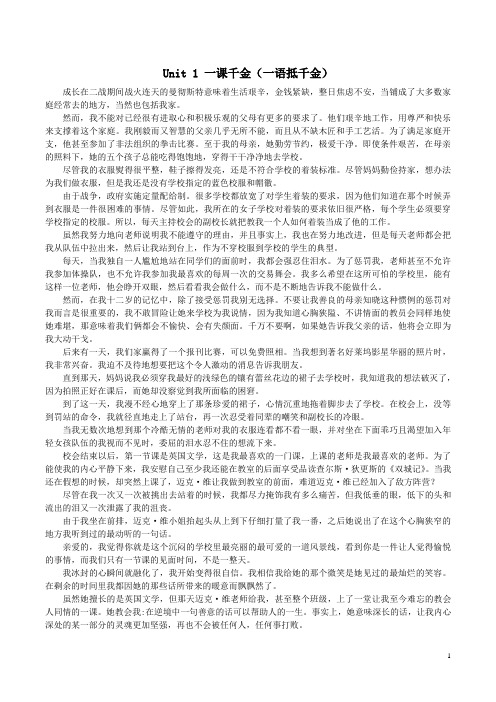
Unit 1 一课千金(一语抵千金)成长在二战期间战火连天的曼彻斯特意味着生活艰辛,金钱紧缺,整日焦虑不安,当铺成了大多数家庭经常去的地方,当然也包括我家。
然而,我不能对已经很有进取心和积极乐观的父母有更多的要求了。
他们艰辛地工作,用尊严和快乐来支撑着这个家庭。
我刚毅而又智慧的父亲几乎无所不能,而且从不缺木匠和手工艺活。
为了满足家庭开支,他甚至参加了非法组织的拳击比赛。
至于我的母亲,她勤劳节约,极爱干净。
即使条件艰苦,在母亲的照料下,她的五个孩子总能吃得饱饱地,穿得干干净净地去学校。
尽管我的衣服熨得很平整,鞋子擦得发亮,还是不符合学校的着装标准。
尽管妈妈勤俭持家,想办法为我们做衣服,但是我还是没有学校指定的蓝色校服和帽徽。
由于战争,政府实施定量配给制。
很多学校都放宽了对学生着装的要求,因为他们知道在那个时候弄到衣服是一件很困难的事情。
尽管如此,我所在的女子学校对着装的要求依旧很严格,每个学生必须要穿学校指定的校服。
所以,每天主持校会的副校长就把教我一个人如何着装当成了他的工作。
虽然我努力地向老师说明我不能遵守的理由,并且事实上,我也在努力地改进,但是每天老师都会把我从队伍中拉出来,然后让我站到台上,作为不穿校服到学校的学生的典型。
每天,当我独自一人尴尬地站在同学们的面前时,我都会强忍住泪水。
为了惩罚我,老师甚至不允许我参加体操队,也不允许我参加我最喜欢的每周一次的交易舞会。
我多么希望在这所可怕的学校里,能有这样一位老师,他会睁开双眼,然后看看我会做什么,而不是不断地告诉我不能做什么。
然而,在我十二岁的记忆中,除了接受惩罚我别无选择。
不要让我善良的母亲知晓这种惯例的惩罚对我而言是很重要的,我不敢冒险让她来学校为我说情,因为我知道心胸狭隘、不讲情面的教员会同样地使她难堪,那意味着我们俩都会不愉快、会有失颜面。
千万不要啊,如果她告诉我父亲的话,他将会立即为我大动干戈。
后来有一天,我们家赢得了一个报刊比赛,可以免费照相。
高级英语第一册unit2
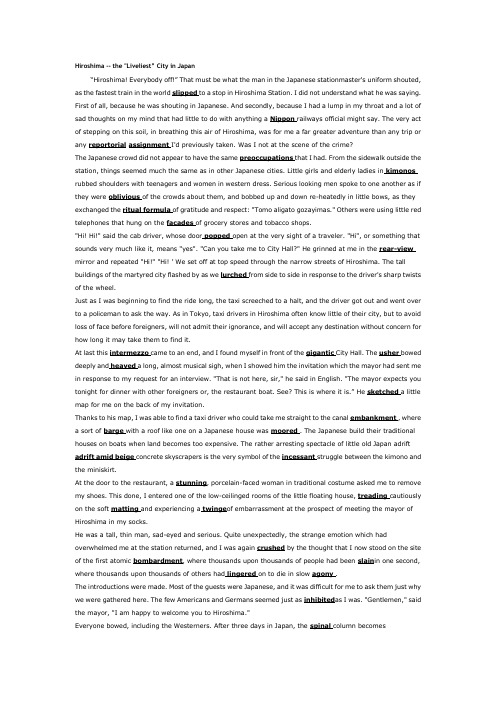
Hiroshima -- the "Liveliest” City in Japan“Hiroshima! Everybody off!” That must be what the man in the Japanese stationmaster's uniform shouted, as the fastest train in the world slipped to a stop in Hiroshima Station. I did not understand what he was saying. First of all, because he was shouting in Japanese. And secondly, because I had a lump in my throat and a lot of sad thoughts on my mind that had little to do with anything a Nippon railways official might say. The very act of stepping on this soil, in breathing this air of Hiroshima, was for me a far greater adventure than any trip or any reportorial assignment I'd previously taken. Was I not at the scene of the crime?The Japanese crowd did not appear to have the same preoccupations that I had. From the sidewalk outside the station, things seemed much the same as in other Japanese cities. Little girls and elderly ladies in kimonos rubbed shoulders with teenagers and women in western dress. Serious looking men spoke to one another as if they were oblivious of the crowds about them, and bobbed up and down re-heatedly in little bows, as they exchanged the ritual formula of gratitude and respect: "Tomo aligato gozayimas." Others were using little red telephones that hung on the facades of grocery stores and tobacco shops."Hi! Hi!" said the cab driver, whose door popped open at the very sight of a traveler. "Hi", or something that sounds very much like it, means "yes". "Can you take me to City Hall?" He grinned at me in the rear-view mirror and repeated "Hi!" "Hi! ’ We set off at top speed through the narrow streets of Hiroshima. The tall buildings of the martyred city flashed by as we lurched from side to side in response to the driver's sharp twists of the wheel.Just as I was beginning to find the ride long, the taxi screeched to a halt, and the driver got out and went over to a policeman to ask the way. As in Tokyo, taxi drivers in Hiroshima often know little of their city, but to avoid loss of face before foreigners, will not admit their ignorance, and will accept any destination without concern for how long it may take them to find it.At last this intermezzo came to an end, and I found myself in front of the gigantic City Hall. The usher bowed deeply and heaved a long, almost musical sigh, when I showed him the invitation which the mayor had sent me in response to my request for an interview. "That is not here, sir," he said in English. "The mayor expects you tonight for dinner with other foreigners or, the restaurant boat. See? This is where it is.” He sketched a little map for me on the back of my invitation.Thanks to his map, I was able to find a taxi driver who could take me straight to the canal embankment , where a sort of barge with a roof like one on a Japanese house was moored . The Japanese build their traditional houses on boats when land becomes too expensive. The rather arresting spectacle of little old Japan adrift adrift amid beige concrete skyscrapers is the very symbol of the incessant struggle between the kimono and the miniskirt.At the door to the restaurant, a stunning, porcelain-faced woman in traditional costume asked me to remove my shoes. This done, I entered one of the low-ceilinged rooms of the little floating house, treading cautiously on the soft matting and experiencing a twinge of embarrassment at the prospect of meeting the mayor of Hiroshima in my socks.He was a tall, thin man, sad-eyed and serious. Quite unexpectedly, the strange emotion which had overwhelmed me at the station returned, and I was again crushed by the thought that I now stood on the site of the first atomic bombardment, where thousands upon thousands of people had been slain in one second, where thousands upon thousands of others had lingered on to die in slow agony .The introductions were made. Most of the guests were Japanese, and it was difficult for me to ask them just why we were gathered here. The few Americans and Germans seemed just as inhibited as I was. "Gentlemen," said the mayor, "I am happy to welcome you to Hiroshima."Everyone bowed, including the Westerners. After three days in Japan, the spinal column becomesextraordinarily flexible."Gentlemen, it is a very great honor to have you her e in Hiroshima."There were fresh bows, and the faces grew more and more serious each time the name Hiroshima was repeated. "Hiroshima, as you know, is a city familiar to everyone,” continued the mayor."Yes, yes, of course,” murmured the company, more and more agitated."Seldom has a city gained such world renown, and I am proud and happy to welcome you to Hiroshima, a town known throughout the world for its--- oysters".I was just about to make my little bow of assent, when the meaning of these last words sank in, jolting me out of my sad reverie ."Hiroshima – oysters? What about the bomb and the misery and humanity's most heinous crime?" While the mayor went on with his speech in praise of southern Japanese sea food, I cautiously backed away and headed toward the far side of the room, where a few men were talking among themselves and paying little attention to the mayor's speech. "You look puzzled," said a small Japanese man with very large eye-glasses."Well, I must confess that I did not expect a speech about oysters here. I thought that Hiroshima still felt the impact of the atomic impact .""No one talks about it any more, and no one wants to, especially, the people who were born here or who lived through it. "Do you feel the same way, too?""I was here, but I was not in the center of town. I tell you this because I am almost an old man. There are two different schools of thought in this city of oysters, one that would like to preserve traces of the bomb, and the other that would like to get rid of everything, even the monument that was erected at the point of impact. They would also like to demolish the atomic museum.""Why would they want to do that?""Because it hurts everybody, and because time marches on. That is why." The small Japanese man smiled, his eyes nearly closed behind their thick lenses. "If you write about this city, do not forget to say that it is the gayest city in Japan, even it many of the town's people still bear hidden wounds, and burns."Like any other, the hospital smelled of formaldehyde and ethere . Stretchers and wheelchairs lined the walls of endless corridors, and nurses walked by carrying Stretchers instruments, the very sight of which would send shivers down the spine of any healthy visitor. The so-called atomic section was located on the third floor. It consisted of 17 beds."I am a fisherman by trade. I have been here a very long time, more than twenty years, "said an old man in Japanese pajamas. “What is wrong with you?”"Something inside. I was in Hiroshima when it happened. I saw the fire ball. But I had no burns on my face or body. I ran all over the city looking for missing friends and relatives. I thought somehow I had been spared. But later my hair began to fall out, and my belly turned to water. I felt sick, and ever since then they have been testing and treating me. " The doctor at my side explained and commented upon the old man's story, "We still hare a handful of patients here who are being kept alive by constant car e. The other s died as a result of their injuries, or else committed suicide . ""Why did they commit suicide?""It is humiliating to survive in this city. If you bear any visible scars of atomic burns, your children will encounter prejudice on the par t of those who do not. No one will marry the daughter or the niece of an atomic bomb victim. People are afraid of genetic damage from the radiation." The old fisherman gazed at me politely and with interest.Hanging over the patient was a big ball made of bits of brightly colored paper, folded into the shape of tiny birds. "What's that?" I asked."Those are my lucky birds. Each day that I escape death, each day of suffering that helps to free me from earthly cares, I make a new little paper bird, and add it to the others. This way I look at them and congratulate myself of the good fortune that my illness has brought me. Because, thanks to it, I have the opportunity to improve my character."Once again, outside in the open air, I tore into little pieces a small notebook with questions that I'd prepared in advance for inter views with the patients of the atomic ward. Among them was the question: Do you really think that Hiroshima is the liveliest city in Japan? I never asked it. But I could read the answer in every eye.。
高级英语1高级英语第一册第二课PPT
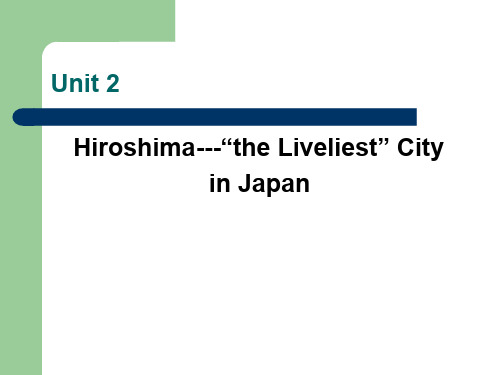
IV. Special Difficulties
--I suffered from a strong feeling of shame when I thought of the scene of meeting the mayor of Hiroshima wearing my socks only.
arrival in Hiroshima Question: what was his attitude toward
Hiroshima?
III . Text Analysis
2. the plots the author looks for his destination.
3.the mayor’s speech and two schools of thought.
5) The few Americans and Germans seemed just as inhibited as I was.
Revision
1. When did the first atomic bomb dropped in Hiroshima?
2. What is the name of the first atomic bomb?
3. How many people were killed in the explosion of the atomic bomb?
每过这样一天我就做一只新的纸鸟放到那一堆纸鸟中去看着这些小鸟并庆幸疾病给我带来好运气
Unit 2
Lesson 2高级英语课程教案第一册

Title Teaching Aims
《高级英语》由张汉熙主编, 外语教学与研究出版社
Unit 2 Hiroshima
1. Improving Reading Skills---- understanding the feature of a radio report 2. Enriching Vocabulary--- enlarging vocabulary cultivating students’ sense of word building understanding that synonyms have fine shades
附页
Text Book
Title
《高级英语》由张汉熙主编, 外语教学与研究出版社
Unit 2 Hiroshima
Teaching Activities (Text Analysis 1 )
4
1. Type of literature: a piece of radio report Introduction Passage to the 2. The purpose of a piece of radio report: to inform the auditors of the truth 3. Some characteristics of radio report: authenticity and objectivity Rhetorical Devices 1. Metaphor 2. Anti-climax (or bathos): It is the opposite of climax, involving stating one’s thoughts in a descending order of significance or intensity, from strong to weak, from weighty to light or frivolous. 3. Rhetorical question
lesson 2高级英语第1册

• “Not the best. Because you not trying.” She gave a little huff as she let go… (Para. 27) • …my mother had traded housecleaning service for weekly lesson and a piano for me to practice on every day. (Para. 29) • I whined and then kicked my foot a little when I couldn’t stand it ... (Para. 30)
Discussion
What do the first three paragraphs tell? 1) the influence of American Dream 2) the tendency of competing with others 3) the transfer of her own hope on her daughter
• And I would see Shirley tapping her feet, or singing a sailor song, or pursing her lips into a very round O… (Para. 4)
• Instead of getting big fat curls, I emerged with an uneven mass of crinkly black fuzz. (Para. 6) • The instructor of the beauty training school had to lop off these soggy clumps to make may hair even again. (Para. 8)
高级英语1何兆熊课后翻译
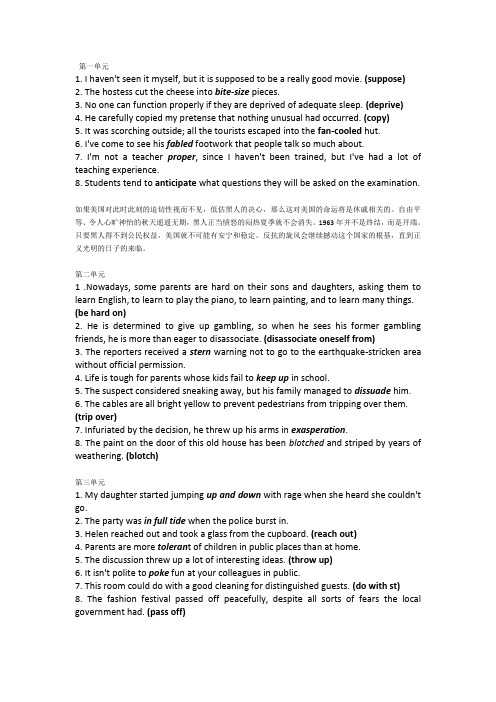
第一单元1. I haven't seen it myself, but it is supposed to be a really good movie. (suppose)2. The hostess cut the cheese into bite-size pieces.3. No one can function properly if they are deprived of adequate sleep. (deprive)4. He carefully copied my pretense that nothing unusual had occurred. (copy)5. It was scorching outside; all the tourists escaped into the fan-cooled hut.6. I've come to see his fabled footwork that people talk so much about.7. I'm not a teacher proper, since I haven't been trained, but I've had a lot of teaching experience.8. Students tend to anticipate what questions they will be asked on the examination.如果美国对此时此刻的迫切性视而不见,低估黑人的决心,那么这对美国的命运将是休戚相关的。
自由平等、令人心旷神怡的秋天遥遥无期,黑人正当愤怒的闷热夏季就不会消失。
1963年并不是终结,而是开端。
只要黑人得不到公民权益,美国就不可能有安宁和稳定。
反抗的旋风会继续撼动这个国家的根基,直到正义光明的日子的来临。
第二单元1 .Nowadays, some parents are hard on their sons and daughters, asking them to learn English, to learn to play the piano, to learn painting, and to learn many things. (be hard on)2. He is determined to give up gambling, so when he sees his former gambling friends, he is more than eager to disassociate. (disassociate oneself from)3. The reporters received a stern warning not to go to the earthquake-stricken area without official permission.4. Life is tough for parents whose kids fail to keep up in school.5. The suspect considered sneaking away, but his family managed to dissuade him.6. The cables are all bright yellow to prevent pedestrians from tripping over them. (trip over)7. Infuriated by the decision, he threw up his arms in exasperation.8. The paint on the door of this old house has been blotched and striped by years of weathering. (blotch)第三单元1. My daughter started jumping up and down with rage when she heard she couldn't go.2. The party was in full tide when the police burst in.3. Helen reached out and took a glass from the cupboard. (reach out)4. Parents are more toleran t of children in public places than at home.5. The discussion threw up a lot of interesting ideas. (throw up)6. It isn't polite to poke fun at your colleagues in public.7. This room could do with a good cleaning for distinguished guests. (do with st)8. The fashion festival passed off peacefully, despite all sorts of fears the local government had. (pass off)每天下午都有一队年迈的妇女在我屋前的马路上走过,每个人都背着一担柴火。
高级英语1高级英语第一册第二课PPT

I. Background Information
I. Background Information
1. The City of Hiroshima
Hiroshima, city on southwestern Honshū Island, Japan, on Hiroshima Bay.
population of 1,085,705 (1990). On August 6, 1945, during World War II (1939-1945), the
Unit 2
Hiroshima---“the Liveliest” City in Japan
Teachingபைடு நூலகம்Points
I. Background information II. Introduction to the passage III. Text analysis IV. Rhetorical devices V. Questions for discussion
Five. Key words of logical paragraph: 1) 1st.paragraph:Hiroshima 2) 2nd-8th paras: Japanese 3) 9th –14th paras: mayor
first atomic bomb was dropped on the city by the United States Army Air Forces. 129,558 people were killed, injured, or missing following the bombing. 68 percent of Hiroshima's buildings were destroyed. Machinery, automobiles, food processing, and the brewing of sake are the main industries.
高级英语第一册第二课PPT
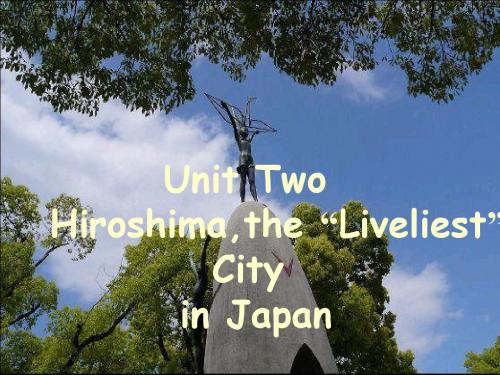
• • • • •
Information covered in Paragraph One: The author didn’t understand Japanese. He was taking a train to come here. He was here on a reportorial mission. He was preoccupied with some sad thoughts. • He was American. • He was tortured by a guilty conscience / the crime of the A-bomb.
have something on one’s mind: be troubled by; =sth. weighs heavy on one’s mind I have had this matter on my mind for a long time. on one’s mind: occupying one’s thought, esp. as a source of worry. She is sleepless because her daughter’s illness is very much on her mind. have sth to do with: (nothing; much; little; a lot) be connected with... What he has done has nothing to do with her.
Meeting the mayor
Detailed Study of the Text
Hiroshima --- the “Liveliest” City in Japan The implication in the title: The rhetoric device used in the title: Irony: saying the opposite of what is meant/ the intended meaning of the words being the opposite of their usual sense.
高中英语 Unit2 Heroes Lesson2教案 北师大版必修1-北师大版高一必修1英语教案
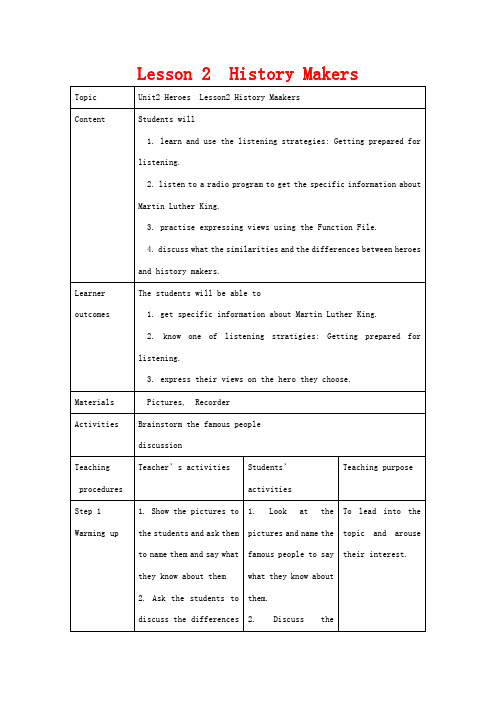
3. Some volunteerpairs share their introduction with the class.
Step5
Post-reading
1. Ask the students to choose one paragraph about the heroes to read and then ask and answer the questions in pairs.
2. Give an example to direct the students to introduce what they have learned from the heros to the partner, using expressions from the function File.
Step 4
While-listening
1. Play the tape for the students to listen.
2. Give examples to helpthestudents to know the stressed words in a sentence.
3. Ask four of them to imitate the sentences in the front.
To get the students to know how to express opinions by using these words.
To get more information about people inthephotos.
高中英语 Unit 1 Great scientists Period Two Integratin
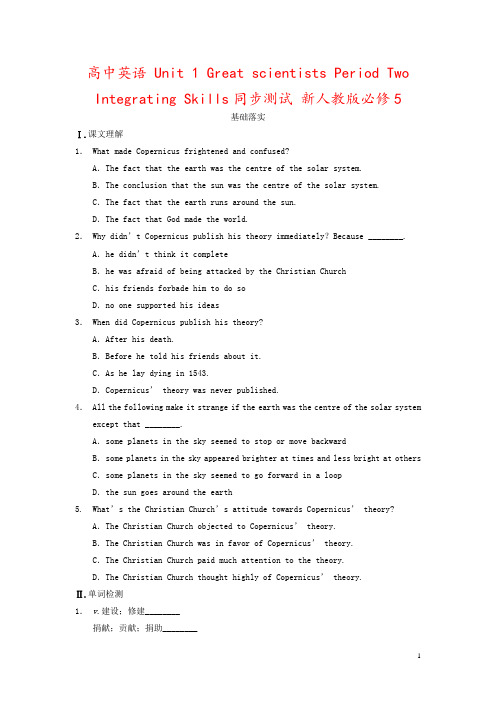
高中英语 Unit 1 Great scientists Period Two Integrating Skills同步测试新人教版必修5基础落实Ⅰ.课文理解1. What made Copernicus frightened and confused?A.The fact that the earth was the centre of the solar system.B.The conclusion that the sun was the centre of the solar system.C.The fact that the earth runs around the sun.D.The fact that God made the world.2.Why didn’t Copernicus publish his theory immediately?Because ________.A.he didn’t think it completeB.he was afraid of being attacked by the Christian ChurchC.his friends forbade him to do soD.no one supported his ideas3. When did Copernicus publish his theory?A.After his death.B.Before he told his friends about it.C.As he lay dying in 1543.D.Copernicus’ theory was never published.4. All the following make it strange if the earth was the centre of the solar system except that ________.A.some planets in the sky seemed to stop or move backwardB.some planets in the sky appeared brighter at times and less bright at others C.some planets in the sky seemed to go forward in a loopD.the sun goes around the earth5. What’s the Christian Church’s attitude towards Copernicus’ theory?A.The Christian Church objected to Copernicus’ theory.B.The Christian Church was in favor of Copernicus’ theory.C.The Christian Church paid much attention to the theory.D.The Christian Church thought highly of Copernicus’ theory.Ⅱ.单词检测1.v.建设;修建________捐献;贡献;捐助________拒绝,不接受;抛弃________(使)旋转;纺(线或纱)________2.n.建设;建筑物________烟火________移动;运动;动作________明亮;亮度;聪颖________宇宙;世界________图表________3.adj.积极的;肯定的;确实的________向后的;退步的________热情的;热心的________小心的;谨慎的________Ⅲ.短语检测1.除……之外;此外__________________2.对……严格的__________________3.讲得通;有意义__________________Ⅳ.选词填空positive,movement,construct,contribute,expose,enthusiastic,cautious,reject,spin,blame1.We __________ his idea for a music club,and decided to have an art club instead. 2.Everything has two sides,the __________ side and the negative side.3.He is a __________ driver,that is,he drives very carefully.4.Mother often __________ me for my carelessness.5.He was brave enough to __________ this terrible criminal.6.She observed the gentle __________ of his chest as he breathed.7.There are two new houses under __________.8.They are determined to make __________ to public safety.9.My friend was very __________ and he was always ready to help me.10.The wheels of the car were __________.Ⅴ.单项填空1. Your father likes to play golf;he’s really enthusiastic ________it.A.by B.about C.with D.on2. The teacher is not only strict ________ his pupils but also strict ________ his own work.A.with;with B.in;inC.in;with D.with;in3. We hope your suggestion will contribute ________ the problem.A.to solving B.to solveC.solving D.solve4. ________ cleaning the yard and making up the beds for the old,we also read newspapers for them and had chats with them.A.Except for B.Rather thanC.Apart from D.Instead of5. No matter how I tried to read it,the sentence didn’t ________to me.A.understand B.make outC.turn out D.make sense6. The doctor has ________ a new idea on the treatment,which is well thought of by his companions.A.come about B.put forwardC.spoken up D.regarded as7. I feel it is your husband who________for the spoiled child.A.is to blame B.is going to blameC.is to be blamed D.should blame8. ________ he came in,I recognized him.A.The moment B.ShortlyC.Soon D.Before long9. Our bad living habits are destroying the earth.Only by changing the way we live ________ the earth.A.save we B.we can saveC.we will save D.can we save10.________ night coming on,they set off for home.A.As B.WithC.By D.WhenⅥ.微写作(黑体部分用本单元词汇表达)西蒙因为接触了致命的病毒而患了重病。
何兆熊综合英语第一册unit2
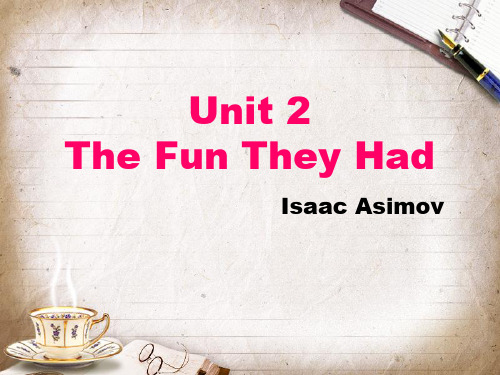
Comprehension question
Can you guess what she meant by a real book? What‟s your opinion of a real book?
diary: a daily record of the events in a person‟s life; journal. 日记 keep a ~ ; read one‟s ~ ; in one‟s ~
Structure of the text
Part 1 Paragraph 1 the background of the story. Part 2 Paragraphs 2-30 development of the story: a contrast of the two different kinds of schools revealed through dialogues Part 3 Paragraphs 31-35 ending of the story: Margie‟s school life and her envy of the fun the kids in the old days must have had.
…it was awfully funny to read words that stood still instead of moving… ( para. 3) …it was very amusing to read words that were motionless instead of moving … still: adj. not moving; staying in the same place不动的; 静止的 e.g. Keep still while I fasten shoe.
(完整)中英-高级英语1何兆熊Unit1ChineseHumanism

Unit 1 Chinese Humanism1. To understand the Chinese ideal of life one must try to understand Chinese humanism. The term 'humanism' is ambiguous. Chinese humanism, however, has a very definite meaning. It implies, first a just conception of the ends of human life; secondly, a complete devotion to these ends; and the thirdly, the attainment of these ends by the spirit of human reasonableness or the Doctrine of the Golden Mean, Which may also be called the Religion of common sense.要了解中国人的人生理想,就必须先了解中国的人文主义。
“人文主义”这个词含义模糊含混,然而中国的人文主义却有它明确的界说。
它的意思是:第一,对人生目的的确切认识;第二,为实现这一目的而行动;第三,实现的方式是心平气和,即中庸之道,也可称作“庸见的崇拜”。
2.The question of the meaning of life has perplexed Western philosophers, and it has never been solved- naturally, when one starts out from the technological point of view, according to which all things, including mosquitoes and typhoid germs, are created for the good of this cocksure humanity. As there is usually too much pain and misery in this life to allow a perfect answer to satisfy man's pride, teleology is therefore carried over to the next life, and this earthly life is then looked upon as a preparation for the life hereafter, in conformity with the logic ofSocrates, which looked upon a ferocious wife as a natural provision for the training of the husband's character. This way of dodging the homes of the dilemma sometimes gives peace of mind for a moment, but then the eternal question, “what is the meaning of life?” comes back. Others, like Nietzsche, take the bull by the horns and refuse to assume that life must have a meaning and believe that progress is in a circle, and human achievements are a savage dance, instead of a trip to the market, but still the question comes back eternally, like the sea waves lapping upon the sho re: “what is the meaning of the life?”人生的意义是什么,这个问题一直使西方哲学家备受困惑。
高级英语第一册Unit 2课文
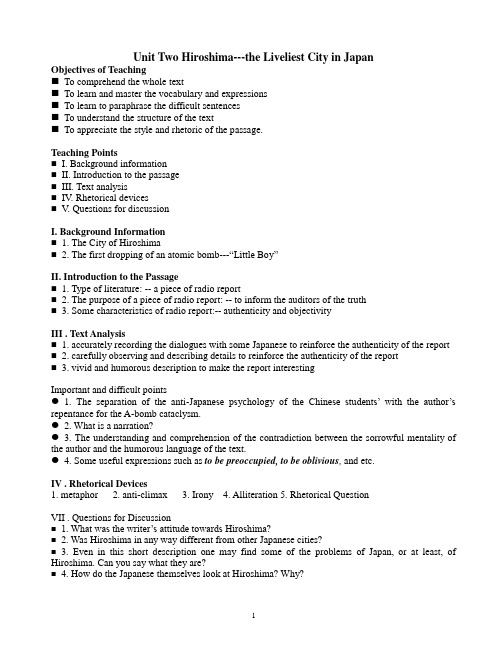
Unit Two Hiroshima---the Liveliest City in JapanObjectives of Teaching⏹To comprehend the whole text⏹To learn and master the vocabulary and expressions⏹To learn to paraphrase the difficult sentences⏹To understand the structure of the text⏹To appreciate the style and rhetoric of the passage.Teaching Points⏹I. Background information⏹II. Introduction to the passage⏹III. Text analysis⏹IV. Rhetorical devices⏹V. Questions for discussionI. Background Information⏹1. The City of Hiroshima⏹2. The first dropping of an atomic bomb---“Little Boy”II. Introduction to the Passage⏹1. Type of literature: -- a piece of radio report⏹2. The purpose of a piece of radio report: -- to inform the auditors of the truth⏹3. Some characteristics of radio report:-- authenticity and objectivityIII . Text Analysis⏹1. accurately recording the dialogues with some Japanese to reinforce the authenticity of the report ⏹2. carefully observing and describing details to reinforce the authenticity of the report⏹3. vivid and humorous description to make the report interestingImportant and difficult points●1. The separation of the anti-Japanese psychology of the Chinese students‟ with the author‟s repentance for the A-bomb cataclysm.●2. What is a narration?●3. The understanding and comprehension of the contradiction between the sorrowful mentality of the author and the humorous language of the text.●4. Some useful expressions such as to be preoccupied, to be oblivious, and etc.IV . Rhetorical Devices1. metaphor2. anti-climax3. Irony4. Alliteration5. Rhetorical QuestionVII . Questions for Discussion⏹1. What was the writer‟s attitude towards Hiroshima?⏹2. Was Hiroshima in any way different from other Japanese cities?⏹3. Even in this short description one may find some of the problems of Japan, or at least, of Hiroshima. Can you say what they are?⏹4. How do the Japanese themselves look at Hiroshima? Why?I. Background Information1. Background Information: War●1938 Munich Pact, which sacrificed Czechoslovakia to Germany●Aug. 1939 Gr. and USSR concluded a non-aggression pact●Sept.1, 1939 Hitler invaded Poland. France and Britain declared war on Gr. immediately, officially beginning World War II. At the same time, USSR annexed Lithuania, Latvia and Estonia.●Jun.22, 1941 Gr. invaded USSR●Dec. 7, 1941 Japan attacked Pearl Harbour, bringing the US into the war●Sept. 1943 Italy surrendered●May. 7, 1945 Gr. surrendered unconditionally●Aug. 6, 1945 the first A-bomb exploded in Hiroshima●Aug. 8, 1945 USSR declared war on Japan and occupied Manchuria●Aug. 9, 1945 the dropping of the second A-bomb on Nagasaki●Aug. 14, 1945 Japan announced its surrender2. Background Information: Atomic Bomb●The explosion produces great amounts of heat, a shock wave and intense radiation. The region of the explosion becomes radioactively contaminated and radioactive products may be deposited elsewhere as fallout.●At 8:15 a.m. on August 6, 1945, by order of President Truman, the first Atomic bomb, nicknamed Little Boy was exploded over a point near the centre of Hiroshima and Nagasaki, destroying almost everything with a radius of 6000 to 8000 feet (1830-2450 meters)●The damage beyond this area was considerable, and over 71,000 people were killed instantly. Many more later died of injuries and the effects of radiation. Casualties numbered nearly 130,000.●Survivors are still dying of leukaemia, pernicious anaemia and other diseases induced by radiation. Almost 98% of the buildings were destroyed or severely damaged.●After the war, The Japanese dedicated post-war Hiroshima to peace. A destroyed area named "Peace City" has been set aside as a memorial. A peace Park was built. A special hospital built here treats people suffering from exposure to radiation and conducts research into its effects.●The ruins of the Institute of Industrial Development, with its warped dome, were preserved as a symbol of the terror of destruction.●The city now is an important producer of iron and steel, motor vehicles, tractors, ships, machinery, sewing needles, paper, textiles, and food products.3. Words from Japanese⏹tempura 日式火锅⏹sake 酒⏹sakura 樱花⏹sushi 寿司⏹kimono 和服⏹judo 柔道⏹tatami 榻榻米⏹karate 徒手自卫术⏹kabuki 歌舞伎⏹kakemono条幅,字画⏹tsunami 海湾浪⏹ikebana 插花⏹tycoon大亨;大企业家⏹sumo相扑⏹Mikado天皇⏹gobang五子棋⏹Hiroshima⏹Nagasaki⏹Tokyo东京⏹Osaka大阪⏹Hokkaido北海道⏹Kyushu九州⏹Honshu本州⏹Kyoto京都⏹Yokohama横滨⏹Sendai仙台⏹Kagoshima鹿儿岛⏹Sapporo札幌⏹Kobe神户⏹Okinawa 冲绳⏹Shikoku四国⏹Nagoya名古屋⏹the Ginza 银座II. Analysis of Structure and Writing Techniques1. Questions for the understanding of the text●1. What is the author? What does he come to Hiroshima for?●2. How did he get to Hiroshima?●3. What was weighing heavily on his mind?●4. Why did he call his trip to Hiroshima a far great adventure?●5. How did the author get to the City Hall?●6. What impression do you have about the cab driver?●7. How did the author describe the city, why?●8. Why did the usher heave a long almost musical sigh? What effect does this have on you?●9. What is the general atmosphere of this part?●10. What do you imagine the mayor looked like?●11. Why did he again sense the emotion that had crushed him at the station?●12. Why was it difficult for him to ask why they were gathered at that specific place?●13. Why did the Americans and Germans seem just as inhibited as he was?●14. What do you imagine the faces looked like each time the name of Hiroshima was repeated?●15. Why do you think the author repeatedly reminds us of the serious appearances and the psychology of the westerners?●16. What do you think the author expected the mayor to say?2. Writing Style●Narration One of the basic and most frequently adopted way of writing. Simply defined, narration is the telling of a story. A good narration has a beginning, a middle and an end.●Narration is concerned with action, with life in motion, with a meaningful series of action. A narrative writing usually tells the time, the background of an event, or the cause and result of it.●In a narrative writing, the actions or the incidents, events are generally presented in order of their occurrence, following the natural time sequence of the happenings. It is called to be in Chronological order. But it can also start in the middle or at some other point in the action and move backward to the earlier happenings. This is called flashback.There are three basic components of a narration:●a. Plot: the frame of the writing, which consists of a series of events. There are usu. one or several climaxes, the highest point of the story, with suspensions, conflicts, to arouse the interest of the audience. After the climax is reached, the story quickly moves to a conclusion.●b. Characters: the leading character is called the hero or protagonist.●c. Background: the time and place of the story●The plot / action usually dominates narration, however, some narratives focus on character or theme or atmosphere.3. Structure—Writing TechniqueSection I: (para 1.)The ArrivalSection II: (The Japanese ...the kimono and the miniskirt.)Way to City Hall, General Impression Section III: (At the door...)Meeting the MayorSection IV: (the hospital)At the Hospital4. Rhetoric Skills1. Irony: a figure of speech in which the meaning literally expressed is the opposite of the meaning intended and which aims at ridicule, humour or sarcasm.§Hiroshima---the Liveliest City in Japan§Each day of suffering that helps to free my from earthly cares§congratulate myself on the good fortune that my illness has brought me2. Anti-Climax: the sudden appearance of an absurd or trivial idea following a serious significant ideas and suspensions. This device is usu. aimed at creating comic or humorous effects.§a town known throughout the world for its---oysters§The duties of a soldier are to protect is country and peel potatoes.3. Alliteration: the repetition of an initial sound that is usu. a consonant in two or more neighboring words.§slip to a stop; tested and treated4. Rhetorical Question: a question that needs no answer, but used for emphasis§Was I not at the scene of the crime?5. Euphemism: the substitution of an agreeable or in-offensive expression for one that may offend or suggest sth unpleasant§He was sentenced to prison---He is now living at the government's expenses.§to go to heaven---dead§to go to the bathroom, do one's business, answer the nature's call, put an end to my life.§Each day of suffering that helps to free me from earthly cares.6. Metonymy: a figure of speech that consists in using the name of one thing for that of something else with which it is associated.§little old Japan adrift amid beige concrete skyscrapers ...struggle between kimono and the miniskirt§I thought that Hiroshima still felt the impact.Metonymy can be derived from various sources:a. Names of persons: Uncle Sam: the USAb. Animals: the bear: the Soviet Union;the dragon: the Chinese (a fight between the bear and the dragon)c. Parts of the body: heart: feelings and emotionshead, brain: wisdom, intelligence, reasonShe was a girl who excited the emotions, but I was not one to let my heart rule my head.grey hair: old aged. Profession: the press: newspapers, reporters etc.He met the press yesterday evening at the Grand Hotel.the bar: the legal professione. location of government, business etc.Downing Street: the British Government;The White House: the US president and his governmentThe Capitol Hill: US CongressIII. Text analysis1. must: expressing an opinion about sth. that is logically very likely;probability⏹There must be something wrong.⏹This must be what he means.⏹sth. that shouldn't be overlooked or missed:⏹This multiplayer is a must for every modern family.⏹对于数以万计的电视观众来说,她的歌唱乃周日晚所必须有的一个节目。
高级英语1 unit two
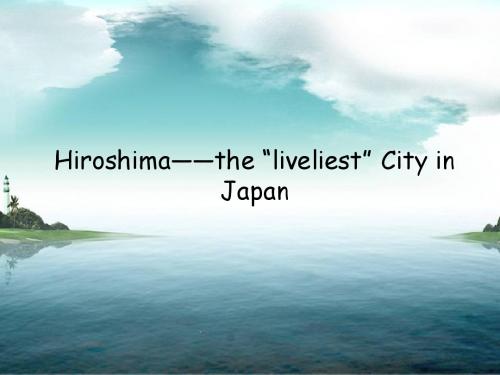
Paraphrase
1) Serious looking men spoke to one another as if they were oblivious of the crowds about them. (para 2) 2) The cab driver’ s door popped open at the very sight of a traveler. (para 3) 3) The rather arresting spectacle of little old Japan adrift amid beige concrete skyscrapers is the very symbol of the incessant struggle between the kimono and the miniskirt. (para 7) 4) I experienced a twinge of embarrassment at the prospect of meeting the mayor of Hiroshima in my socks. (para 8)
Paraphrase
5) The few Americans and Germans seemed just as inhibited as I was. (para 9) 6) After three days in Japan, the spinal column becomes extraordinarily flexible. (para 11) 7) I was about to make my little bow of assent, when the meaning of these last words sank in, jolting me out of my sad reverie. (para 17) 8) I thought somehow I had been spared. (page 17)
高级英语unit__何兆熊
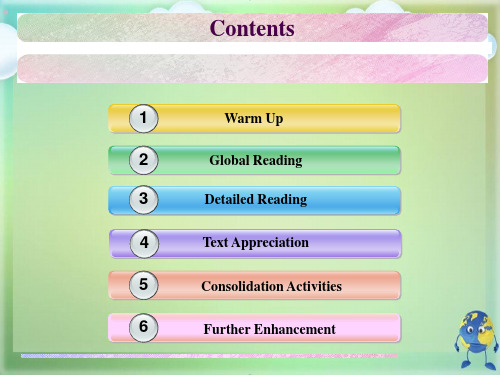
Take the quiz below to see how well you know about humanism.
1. Humanism is the assertion of the greatness of man. T/F? T
2. The earliest humanists during the period of Western Renaissance had interest only in classic literature. T/F? F
Section 1: Warm Up
Lead-in
Background Information
About the Author
Lin Yutang: a Chinese writer, translator, and editor, born in Longxi (now Zhangzhou), Fujian Province, educated in China and at Harvard, with Ph.D. from University of Leipzig in 1923. Lin spent most of his life in the United States and wrote most of his works in English.
primogenitor. T/F? F
Section 1: Warm Up
Lead-in
Background Information
6. In classic Chinese humanism, ethical philosophy is based
on human values rather than the supernatural. T/F?
高级英语1(何兆熊史志康)unit2
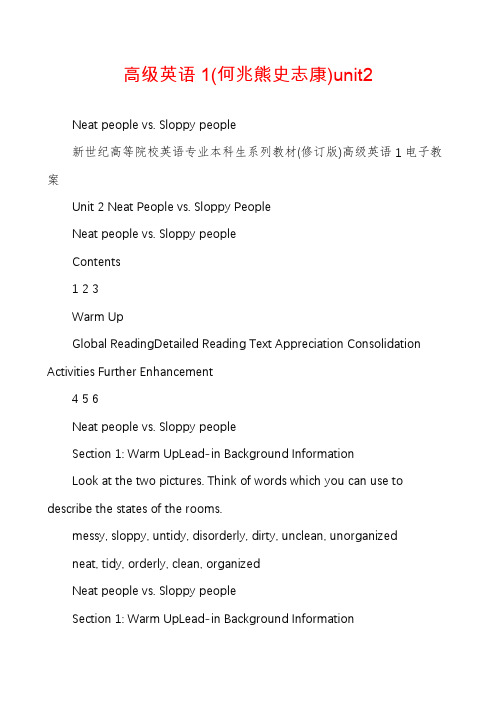
高级英语1(何兆熊史志康)unit2Neat people vs. Sloppy people新世纪高等院校英语专业本科生系列教材(修订版)高级英语1电子教案Unit 2 Neat People vs. Sloppy PeopleNeat people vs. Sloppy peopleContents1 2 3Warm UpGlobal ReadingDetailed Reading Text Appreciation Consolidation Activities Further Enhancement4 5 6Neat people vs. Sloppy peopleSection 1: Warm UpLead-in Background InformationLook at the two pictures. Think of words which you can use to describe the states of the rooms.messy, sloppy, untidy, disorderly, dirty, unclean, unorganizedneat, tidy, orderly, clean, organizedNeat people vs. Sloppy peopleSection 1: Warm UpLead-in Background Information1. Which room would you like to work in?2. What is your room like?3. Look at another picture and tell what the picture implies.4. Does Suzanne Britt, author of the text we’re going to study, think in the same way?Neat people vs. Sloppy peopleSection 1: Warm UpLead-in Background InformationThe picture implies that sloppiness is a moral problem, not just a problem of habit, for sloppy people are also “evil” people.Neat people vs. Sloppy peopleSection 1: Warm UpLead-in Background InformationAbout the Author Suzanne Britt: A poet and essayist, and Assistant Professor of English. Suzanne Britt was born in Winston-Salem, North Carolina. She earned her bachelor’s degree from Salem College and her master’s degree from Washington University. Britt currently teaches literature and writing courses at Meredith College in North Carolina.Neat people vs. Sloppy peopleSection 1: Warm UpLead-in Background InformationA prolific writer, Britt’s poems have appeared in quite a few literary magazines; her essays and articles have appeared in various newspapers and magazines, including Newsweek, The New York Times and The Boston Globe. Some of them have also been widely reprinted in college textbooks. Britt is author of several books, including Show and Tell (1982), and AWriter’s Rhetoric (1988). She also advises The Meredith Herald and The Colton Review.Neat people vs. Sloppy peopleSection 2: Global ReadingMain Idea Structural AnalysisWhat is the text mainly about? Through a comparison of the peculiarities of sloppy people and neat people in their daily life, the author is trying to convince the readers of the argument that the main distinction between the two types of people is a moral one, and furthermore, sloppy people are even morally superior to neat people.Neat people vs. Sloppy peopleSection 2: Global ReadingMain Idea Structural AnalysisPlease divide the text into 3 parts and summarize the main idea of each part. Part I (Paragraph 1) IntroductionIn Paragraph 1, the author introduces the topic of the text and presents her opinion that “neat people are lazier and meaner than sloppy people”.Neat people vs. Sloppy peopleSection 2: Global ReadingMain Idea Structural AnalysisPart II(Paragraphs 2-5) Description of Sloppy PeopleParagraphs 2-5 focus on sloppy people who are portrayed as having a high moral standard and ambitious plans. Besides, they are alsodescribed as “giving loving attention to every detail”. Part III (Par agraphs 6-12) Description of Neat People Paragraphs 6-12 concentrate on the description of neat people. In these paragraphs, neat people are portrayed as cold-blooded, ruthless and very practical.Neat people vs. Sloppy peopleSection 3: Detai led ReadingNeat People vs. Sloppy People1 I’ve finally figured out the difference between neat people and sloppy people. The distinction is, as always, moral. Neat people are lazier and meaner than sloppy people. 2 Sloppy people, you see, are not really sloppy. Their sloppiness is merely the unfortunate consequence of their extreme moral rectitude. Sloppy people carry in their mind’s eye a heavenly vision, a precise plan, that is sostupendous, so perfect, it can’t be achieved in this world or the next.__NNeat people vs. Sloppy peopleSection 3: Detailed Reading3 Sloppy people live in Never-Never Land. Someday is their mé tier. Someday they are planning to alphabetize all their books and set up home catalogs. Someday they will go through their wardrobes and mark certain items for tentative mending and certain items for passing on to relatives of similar shape and size. Someday sloppy people will make familyscrapbooks into which they will put newspaper clippings, postcards, locks of hair, and the dried corsage from their senior prom. Someday they will file everything on the surface of their desks, including the__N Neat people vs. Sloppy peopleSection 3: Detailed Readingcash receipts from coffee purchases at the snack shop.Someday they will sit down and read all the back issues of The New Yorker. 4 For all these noble reasons and more, sloppy people never get neat. They aim too high and wide. They save everything, planning someday to file, order, and straighten out the world. But while these ambitious plans take clearer and clearer shape in their heads, the books spill from the shelves onto the floor, the clothes pile up in the hamper and closet, the family__NNeat people vs. Sloppy peopleSection 3: Detailed Readingmementos accumulate in every drawer, the surface of the desk is buried under mounds of paper and the unread magazines threaten to reach the ceiling. 5 Sloppy people can’t bear to part with anything. They give loving attention to every detail. When sloppy people say they’re going to tackle the surface of the desk, they really mean it. Not a paper will go unturned; not a rubber band will go unboxed. Four hours or two weeks into the excavation, thedesk looks exactly the same, primarily because the sloppy person ismeticulously creating new piles of papers with newNeat people vs. Sloppy peopleSection 3: Detailed Readingheadings and scrupulously stopping to read all the old bookcatalogs before he throws them away. A neat person would just bulldoze the desk. 6 Neat people are bums and clods at heart. They have cavalier attitudes toward possessions, including family heirlooms. Everything is just another dust-catcher to them. If anything collects dust, it’s got to go and that’s that. Neat people will toy with the idea of throwing the children out of the house just to cut down on the clutter.__N Neat people vs. Sloppy peopleSection 3: Detailed Reading7 Neat people don’t care about process. They like results. What t hey want to do is get the whole thing over with so they can sit down and watch the rasslin’ on TV. Neat people operate on two unvarying principles: Never handle any item twice, and throw everything away. 8 The only thing messy in a neat person’s house is t he trash can. The minute something comes to a neat person’s hand, he will look at it, try to decide if it has immediate use and, finding none, throw it in the trash.Neat people vs. Sloppy peopleSection 3: Detailed Reading9 Neat people are especially vicious withmail. They never go through their mail unless they are standing directly over a trash can. If the trash can is beside the mailbox, even better. All ads, catalogs, pleas for charitable contributions, churchbulletins and money-saving coupons go straight into the trash can without being opened. All letters from home, postcards from Europe, bills and paychecks are opened, immediately responded to, then dropped in the trash can. Neat people keep their receipts only for tax purposes. That’s it. No sentimental salvaging of birthday cards or the last letter a Neat people vs. Sloppy peopleSection 3: Detailed Readingdying relative ever wrote. Into the trash it goes.10 Neat people place neatness above everything, even economics. They are incredibly wasteful. Neat people throw away several toys every time they walk through the den. I knew a neat person once who threw away a perfectly good dish drainer because it had mold on it. The drainer was too much trouble to wash. And neat people sell their furniture when they move. They will sell a La-Z-Boy recliner while you are reclining in it.Neat people vs. Sloppy peopleSection 3: Detailed Reading11 Neat people are no good to borrow from. Neat peoplebuy everything in expensive little single portions. They get their flour and sugar in two-pound bags. They wouldn’t consider clipping a coupon,saving a leftover, reusing plastic nondairy whipped cream containers or rinsing off tin foil and draping it over the unmoldy dish drainer. You can never borrow a neat person’s newspaper to see what’s playing at the movies. Neat people have the paper all wadded up and in the trash by 7:05 A.M.__N。
高级英语第一册 Unit 2 Hiroshima—the “liveliest” city in Japan
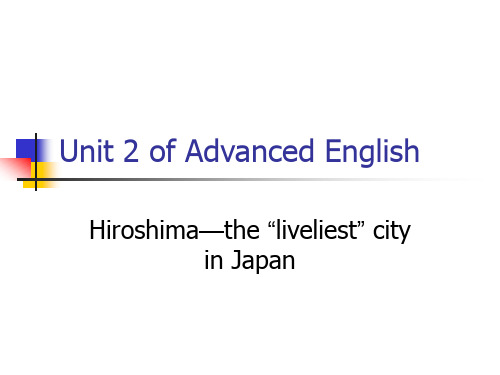
Questions on the first part:
What is the central idea of the first part? Why couldn’t the author understand what the stationmaster said? What is on his mind? Why did he think his journey was the greatest adventure? What does the author describe in the second paragraph? What impression do you have on the Japanese taxi driver?
on one's mind: occupying one's thoughts, esp. as a source of worry I’m glad you want to talk about this. It’s been on my mind for weeks. I think I know what’s in your mind. Cf: be of the same mind, be of one mind, be out of one’s mind, be in one’s right mind, dismiss from one’s mind, bring to mind, call to mind, give one’s mind to/keep one’s mind on/set one’s mind on,
Was I not at the scene of the crime? I was now at the place where the first Abomb was dropped
- 1、下载文档前请自行甄别文档内容的完整性,平台不提供额外的编辑、内容补充、找答案等附加服务。
- 2、"仅部分预览"的文档,不可在线预览部分如存在完整性等问题,可反馈申请退款(可完整预览的文档不适用该条件!)。
- 3、如文档侵犯您的权益,请联系客服反馈,我们会尽快为您处理(人工客服工作时间:9:00-18:30)。
study, think in the same way?
Section 1: Warm Up
Lead-in
Background Information
The picture implies that sloppiness is a moral problem, not just a problem of habit, for sloppy people are also “evil” people.
Section 2: Global Reading
Main Idea
Structural Analysis
Please divide the text into 3 parts and summarize the main idea of each part.
Part I (Paragraph 1) Introduction
Section 1: Warm Up
Lead-in
Background Information
A prolific writer, Britt’s poems have appeared in quite a few literary magazines; her essays and articles have appeared in various newspapers and magazines, including Newsweek, The New York Times and The Boston Globe. Some of them have also been widely reprinted in college textbooks. Britt is author of several books, including Show and Tell (1982), and A Writer’s Rhetoric (1988). She also advises The Meredith Herald and The Colton Review.
6
Further Enhancement
Section 1: Warm Up
Lead-in
Background Information
Look at the two pictures. Think of words which you can use to describe the states of the rooms.
Section 2: Global Reading
Main Idea
Structural Analysis
What is the text mainly about?
Through a comparison of the peculiarities of sloppy people and neat people in their daily life, the author is trying to convince the readers of the argument that the main distinction between the two types of people is a moral one, and furthermore, sloppy people are even morally superior to neat people.
Section 1: Warm Up
Lead-in
Background Information
About the Author
Suzanne Britt: A poet and essayist, and Assistant Professor of English. Suzanne Britt was born in Winston-Salem, North Carolina. She earned her bachelor’s degree from Salem College and her master’s degree from Washington University. Britt currently teaches literature and writing courses at Meredith College in North Carolina.
In Paragraph 1, the author introduces the topic of the text and presents her opinion that “neat people are lazier and meaner than sloppy people”.
Section 2: Global Reading
Main Idea
Structural Analysis
Part II (Paragraphs 2-5) Description sy, sloppy, untidy, disorderly, dirty, unclean, unorganized
neat, tidy, orderly, clean, organized
Section 1: Warm Up
Lead-in
Background Information
1. Which room would you like to work in? 2. What is your room like? 3. Look at another picture and tell what the picture
新世纪高等院校英语专业本科生系列教材(修订版)高级英语1电子教案
Unit 2 Neat People vs. Sloppy People
Contents
1
Warm Up
2
Global Reading
3
Detailed Reading
4
Text Appreciation
5
Consolidation Activities
